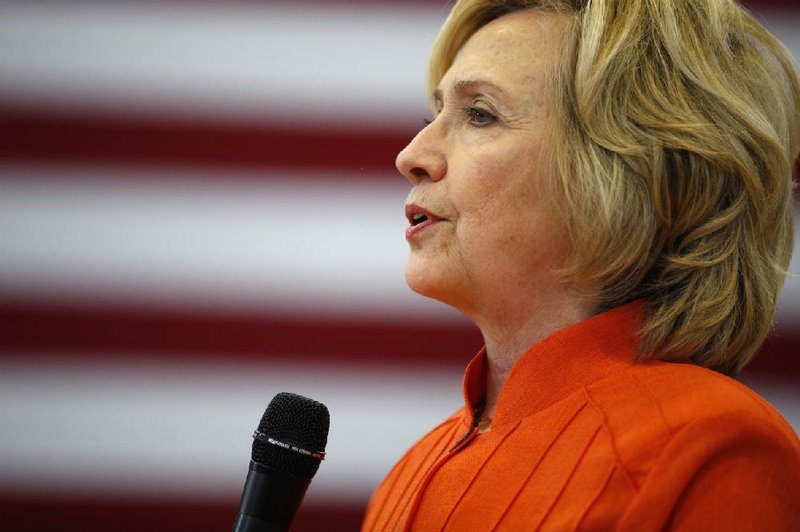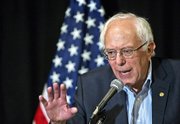LAS VEGAS -- In deciding between Hillary Rodham Clinton and Bernie Sanders, labor unions face a difficult choice.
Clinton has campaigned as a fighter for middle-class families, and carries with her establishment support and ties to labor leaders reaching back to her husband's White House years. But her unwillingness to take a position on the Trans-Pacific Partnership, a proposed trade pact opposed by labor unions, has made some union leaders and workers wary of her.
Sanders, meanwhile, has made economic equality and his opposition to the trade deal central to his campaign. At large rallies across the country, the Vermont senator has championed a $15-an-hour minimum wage and a single-payer health care system, putting him in line with many union aspirations.
"I would say to the AFL-CIO, 'Take a hard look at my record. Take a hard look at Secretary Clinton's record,'" Sanders told reporters after meeting leaders of the Nevada AFL-CIO this week, rejecting a "mythology going around" that the Democratic socialist can't win the presidential nomination.
Clinton, Sanders and former Maryland Gov. Martin O'Malley have been meeting with labor unions this summer, seeking their stamps of approval and their army of volunteers that can fuel campaigns. Clinton and Sanders met Tuesday with the Nevada AFL-CIO at the Luxor Hotel and Casino; O'Malley addressed the group Wednesday.
Clinton, who also toured a Las Vegas training center run by the United Brotherhood of Carpenters union, released a new ad Wednesday in Iowa and New Hampshire with a pro-labor message. In the ad, she says, "When you see that you've got CEOs making 300 times what the average worker's making, you know the deck is stacked in favor of those at the top."
For labor, Sanders' rise in the polls and Clinton's trade agenda have made its calculations more difficult. Unions that endorse Clinton this year might gain more clout if the former secretary of state wins the White House. But some union leaders may risk a backlash from rank-and-file members who have been drawn to Sanders' blunt, anti-establishment message.
"Business as usual has not worked," said Larry Cohen, former president of the Communications Workers of America who is now helping Sanders' campaign. "It has not worked in the last six years. It didn't work in the Clinton years."
Yet helping Sanders may have limited benefits if he fails to gain traction against Clinton in early states. And some unions could extract more leverage over the Democratic field by waiting.
Many of the biggest unions have yet to endorse either candidate. Among them are the American Federation of State, County and Municipal Employees -- which is led by Lee Saunders, an ally of Clinton when she represented New York in the Senate -- and the nation's largest union, the National Education Association -- which sat out the 2008 primaries but wants to have more influence this time.
The Service Employees International Union, which offered critical support to Barack Obama in 2008, has been involved in a number of progressive causes and could serve as a bellwether for labor during the campaign. Clinton has held events with that union's officials in recent months.
"If some of the bigger unions -- AFSCME, NEA, SEIU -- were in the fall to support Clinton, that would be a setback for Sanders," said Steve Rosenthal, a former political director for the AFL-CIO.
Sanders has been endorsed by the 185,000-member National Nurses United -- which has opposed the trade deal -- and he's courted support from unions representing postal workers and transit workers.
O'Malley employed a different strategy in courting labor in Nevada on Wednesday. He stood in a crowded median in front of the Trump International Hotel -- a gleaming gold tower just behind the Las Vegas Strip -- alongside workers hoping to unionize several hundred hotel employees, including immigrants.
"There are no two greater contrasts than an economy that works for all of us and the sort of economy that Donald Trump would seek to have the Republican Party construct in the United States," he said. "So that's why I chose to come here."
The AFL-CIO, an umbrella organization of the largest labor unions, interviewed all of the Democratic candidates last month in Silver Spring, Md., but has not reached a consensus among its members. The AFL-CIO has traditionally avoided early endorsements -- it last got involved in a primary in 2000 when it backed then-Vice President Al Gore.
Clinton won her first major labor endorsement of the presidential campaign last month, from the 1.6 million member American Federation of Teachers. Last week, she secured the backing of the International Association of Machinists and Aerospace Workers, which represents nearly 600,000 workers.
Clinton has declined to take a firm position on the trade deal. She's pointed to her work as secretary of state to lay the groundwork for the agreement, and cited the need for it to protect U.S. jobs and national security.
Clinton's labor supporters argue that the trade agreement won't be the sole determining factor when it comes time for unions to make their endorsement decisions.
"It's bigger than just one issue," said Randi Weingarten, president of the American Federation of Teachers.
Information for this article was contributed by Kimberly Pierceall of The Associated Press.
A Section on 08/20/2015


